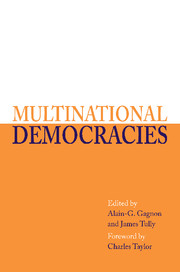Book contents
- Frontmatter
- Contents
- Notes on the contributors
- Foreword by Charles Taylor
- Acknowledgements
- Introduction
- Part I Justice and stability in multinational democracies
- 1 So many nations, so few states: territory and nationalism in the global era
- 2 Political stability in multinational democracies: comparing language dynamics in Brussels, Montreal and Barcelona
- 3 Justice and stability in multinational societies
- 4 Political liberalism in multinational states: the legitimacy of plural and asymmetrical federalism
- Part II Struggles over recognition and institutions of accommodation
- Part III Modes of reconciliation and conflict management
- References
- Index
3 - Justice and stability in multinational societies
Published online by Cambridge University Press: 06 October 2009
- Frontmatter
- Contents
- Notes on the contributors
- Foreword by Charles Taylor
- Acknowledgements
- Introduction
- Part I Justice and stability in multinational democracies
- 1 So many nations, so few states: territory and nationalism in the global era
- 2 Political stability in multinational democracies: comparing language dynamics in Brussels, Montreal and Barcelona
- 3 Justice and stability in multinational societies
- 4 Political liberalism in multinational states: the legitimacy of plural and asymmetrical federalism
- Part II Struggles over recognition and institutions of accommodation
- Part III Modes of reconciliation and conflict management
- References
- Index
Summary
Introduction
The first line of the first section of the first chapter of John Rawls's monumental first book thunders in a way that almost none of the subsequent lines ever do: ‘Justice is the first virtue of social institutions, as truth is of systems of thought’ (Rawls 1971, p. 3). Although he will apologise in the second paragraph for probably stating his convictions too strongly, he allows himself the rest of the first paragraph to reveal the radical idea he has in mind.
A theory, however elegant and economical, must be rejected or revised if it is untrue; likewise, laws and institutions, no matter how efficient and well arranged, must be reformed or abolished if they are unjust. Each person possesses an inviolability founded on justice that even the welfare of society as a whole cannot override. For this reason justice denies that the loss of freedom for some is made right by a greater good shared by others. It does not allow that the sacrifices imposed on a few are outweighed by the larger sum of advantages enjoyed by many. Therefore in a just society the liberties of equal citizenship are taken as settled; the rights secured by justice are not subject to political bargaining or to the calculus of social interests. The only thing that permits us to acquiesce in an erroneous theory is the lack of a better one; analogously, an injustice is tolerable only when it is necessary to avoid an even greater injustice. Being first virtues of human activities, truth and justice are uncompromising.
(Rawls 1971, pp. 3–4)- Type
- Chapter
- Information
- Multinational Democracies , pp. 90 - 109Publisher: Cambridge University PressPrint publication year: 2001
- 5
- Cited by



